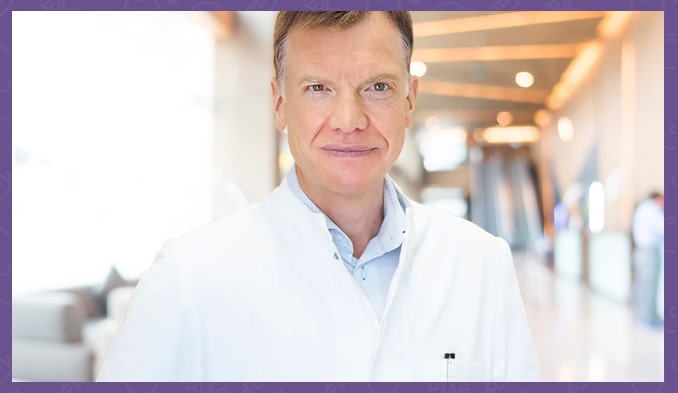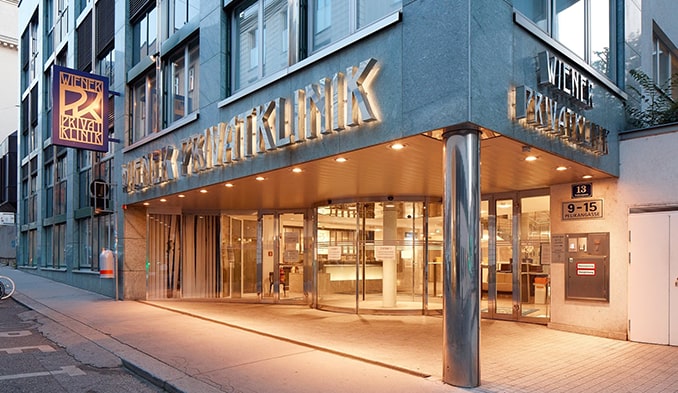We talk to Prof. Dr. Martin Schindl, specialist in abdominal surgery on cancer of the pancreas:
-
Are age and obesity the main factors for pancreatic cancer?
Being overweight is one of the risk factors along with obesity. However, it is modifiable as measures can be taken against it to improve a person's physical condition. In contrast, age remains an irreversible risk factor that unfortunately cannot be avoided.
-
How does this cancer affect the pancreas?
In pancreatic cancer, there are several key symptoms that play an important role and, through further investigations, can help to diagnose the disease in time. The endocrine and exocrine function of the pancreas is impaired due to the formation of cancer cells as a result of the growth of the tumour itself. These processes cause weight loss in patients and also bloating in the abdomen due to the body's inability to process the nutrients taken in. Insulin deficiency leads to the development of diabetes, and one of the main symptoms is diarrhea accompanied by fatty stools.
-
When is this disease diagnosed and does gender and age matter for its onset?
At the time of diagnosis, in most cases, the pancreatic cancer has already progressed, it has infiltrated the surrounding anatomical structures and is accompanied by the appearance and development of metastases. Usually, only in 25% of cases, patients can be diagnosed with cancer in a resectable state, that is, it can be removed with surgery. Men are most commonly affected by this disease, and the age limit is between 60 and 70 years.
-
Does pancreatic cancer affect other organs?
In most cases, cancer cells spread to the patient's liver, to the peritoneal membrane or to the so-called regional lymph nodes (locoregional lymph nodes). In some rarer cases, cancer cells may also be found in the bones of the body or in the patient's lungs.
-
What are the most common symptoms of this disease?
One of the main symptoms of pancreatic cancer is weight loss, which can last over a period of several weeks. Painless jaundice is also among the most common symptoms of the disease. Usually, besides these, the patient may also lose the desire to take food and start experiencing pain in the upper abdominal area that spreads to the back.
-
By what tests can the patient's diagnosis be determined?
To detect pancreatic cancer in patients with already concomitant signs, a special X-ray CT (computed tomography) scan with high resolution and contrast enhancement is used. After obtaining the results, it is possible to determine whether the patient can undergo resection. In order to make the correct diagnosis, it is also necessary to order blood tests for aspartate aminotransferase (GOT), alanine aminotransferase (GPT) and gamma-glutamyltransferase (GGT), tests necessary to assess liver health. Also included are tests of the enzyme alkaline phosphatase and the bile pigment bilirubin, testing of the tumor markers blood antigen 19-9 (CA19.9) and carcinoembryonic antigen (CEA), and testing of the enzymes pancreatic amylase and lipase. In some cases, when the obtained results are not clear enough, further investigations with endoscopic ultrasound-guided biopsy and contrast-enhanced magnetic resonance imaging (MRI) are ordered.
-
Are complications possible with this disease?
Pancreatic cancer can lead to a state of pulmonary embolism, also to thrombosis. Due to its influence on the blood circulation in the patient's body, paraneoplastic syndrome may develop. When the cancer develops in the head of the pancreas, it can lead to painless obstructive jaundice, which can cause damage to the patient's general health and, in particular, impair the function of the liver, cause problems with the absorption of food and contribute to the development of cholangitis.
-
What is the treatment needed at different stages of pancreatic cancer?
In the treatment of pancreatic cancer, surgical intervention is necessary through an operative method to remove the entire affected organ and metastases to surrounding tissues, called radical resection. This treatment is not suitable for every patient, as in only 25% of cases after diagnosis is it possible to perform such manipulation. Neoadjuvant treatment, via chemotherapy and radiotherapy, is therefore required in the majority of cases in order to control the tumour and reduce its size. This method is applied to facilitate further treatment and to create the possibility of surgical intervention by radical resection, with a duration of 3 to 6 months.
-
What is needed for successful treatment of the disease?
In order to apply quality treatment to a patient suffering from pancreatic cancer, it is extremely important to correctly diagnose the stage of the disease. After which it is also necessary to plan the appropriate treatment according to the needs of the patient. In more severe cases, when the tumor is advanced, neoadjuvant treatment is prescribed to help control the malignancy and make it completely removable. When the pancreatic cancer is resectable, the patient undergoes surgery to remove the tumor.
After the radical resection is performed to remove the cancer and metastases, a treatment method called adjuvant chemotherapy is used to achieve lasting results and prevent the risk of tumor recurrence.
-
Is it possible to prevent pancreatic cancer?
To avoid the occurrence of this disease, it is advisable to follow a healthy diet and lifestyle, frequent physical activity and stress reduction. The main factors that can lead to the development of pancreatic cancer are being overweight and smoking cigarettes, so their use is not recommended.









